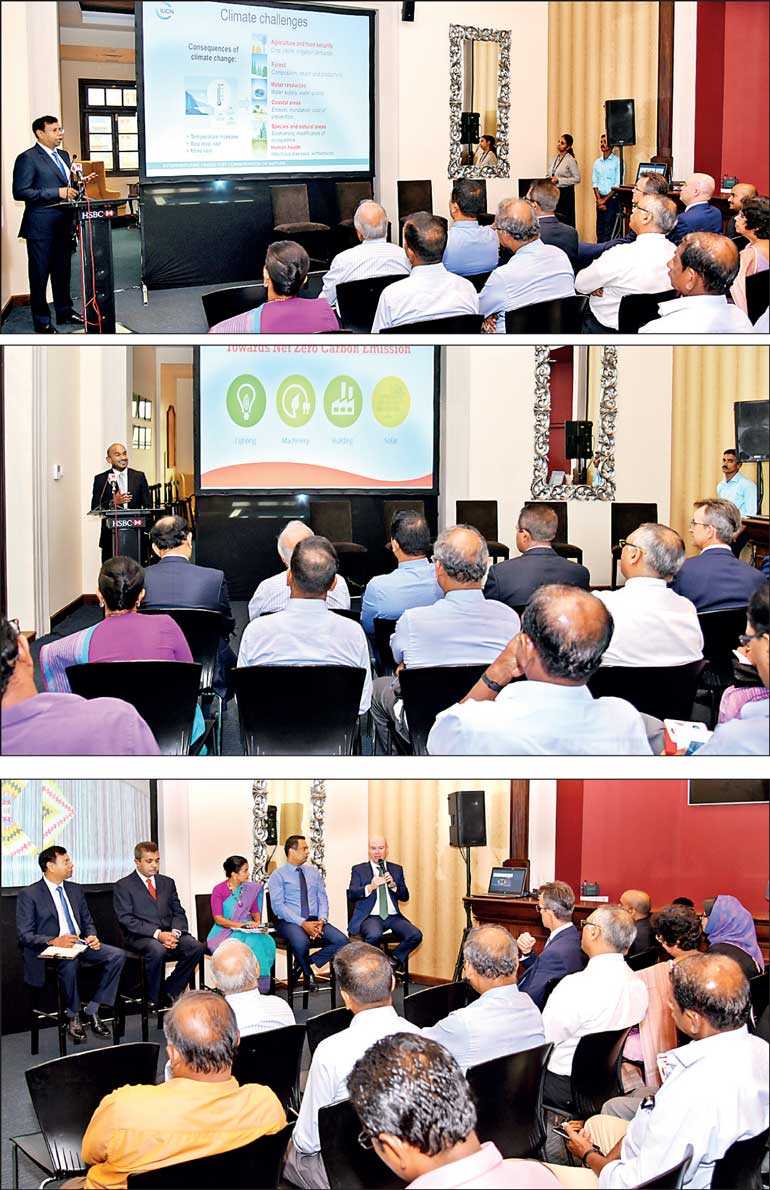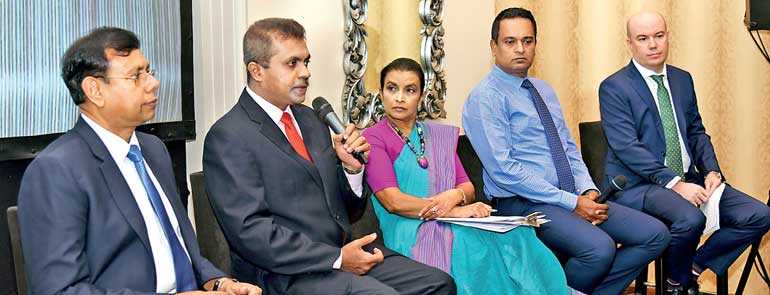Monday Feb 23, 2026
Monday Feb 23, 2026
Thursday, 5 December 2019 00:00 - - {{hitsCtrl.values.hits}}


By Divya Thotawatte
In an effort to support the concept of responsible fashion, HSBC Bank, in partnership with International Union for Conservation of Nature (IUCN), launched a project to develop a cohesive low carbon  development transition strategy last week.
development transition strategy last week.
The strategy is to be developed in partnership with the Joint Apparel Association Forum of Sri Lanka (JAAFSL), National Cleaner Production Centre (NCPC) and the Board of Investment (BOI) based on research conducted by IUCN. The strategy is to help the local apparel industry to transition into a low carbon environment supporting the global mandate of ‘responsible fashion’.
On the path to a sustainable environmental footprint, it is not large enterprises but small and medium enterprises that should be focused on most because they are not always facilitated with enough financing to do so, said HSBC Sri Lanka and Maldives CEO Mark Prothero.
“In this venture, we’re looking at the total supply chain of the local industry, the smaller and medium sized enterprises that haven’t yet embarked on their journeys as the larger companies have been through. We believe that a cohesive strategic guidance and fact-based knowledge is required for making that transition in Sri Lanka. Through our investment, research and thought leadership we aim to help and guide the industry to be more sustainable. To the apparel industry, sustainability is an environmental issue, but it’s also important in terms of businesses. The Sri Lankan apparel industry must embrace the global mandate of ‘Responsible fashion’ to ensure a positive edge in the challenging global market.”
Prothero also added that the industry contributed to a high environmental footprint, impacting the water, energy consumption, and chemicals. He said that at there was no common strategy to reduce those negative footprints or well-defined mechanisms to adopt sustainable financing.
“The apparel industry is a critical income earner for Sri Lanka, and supporting its transition into greener development is imperative for the growth and long-term stability of the industry. With this project, HSBC is moving beyond transactional corporate social responsibility to more a knowledge-based contribution that benefits the communities, the environment and the country at large. We believe that knowledge based intervention is the best way to ensure that change is impactful and sustainable in the long run,” he explained.
According to Prothero, the strategy also delivers on several UN Sustainable Development Goals, namely, SDG6: Ensure availability and sustainable management of water and sanitation for all; SDG9: Build resilient infrastructure, promote inclusive and sustainable industrialisation and foster innovation; SDG11: Making cites and human settlements inclusive, safe, resilient and sustainable; and SDG13: Take urgent action to combat climate change and its impacts.
IUCN Sri Lanka Country Representative Dr. Ananda Mallawatantri who delivered the keynote speech at the event spoke about the adverse impacts of climate change and global warming such as high intensity rain, temperature rising and seasonal shifts in agriculture and, the reactions from the global community such as the Paris Agreement which looks at taking down emissions and helping the affected people. He stressed on the importance of contributing to combat climate change in order to mitigate the impacts of the rising temperature.
Mallawatantri highlighted that sustainable financing is not just about profits and losses, but about thinking beyond the balance sheet and working for the environment, governance and working towards improving the industry’s footprints while reducing certain emissions to help the industry, as the people require money to purchase the industry produces.
“Consultations envisaged during the strategy development will include regulatory agencies, apparel industry senior managers and technical level staff, environment auditors who are familiar with the industry operations and processes. We will also review the international knowledge bases on the subjects involved,” he said.
In 2017, HSBC pledged $ 100 b for sustainable financing and in practice this translates to HSBC being a leading global partner in financing, managing and shaping the transition in to a low carbon future. HSBC is committed to finance projects which will help deliver 2015 Paris Climate Agreement and the UN Sustainable Development Goals (SDGs).
The Hongkong and Shanghai Banking Corporation Limited is the founding member of the HSBC Group, which serves our customers through four global businesses: Retail Banking and Wealth Management, Commercial Banking, Global Banking and Markets, and Global Private Banking. HSBC serves customers worldwide from offices in 65 countries and territories in our geographical regions: Europe, Asia, North America, Latin America, and Middle East and North Africa. With assets of US$2,728bn at 30 September 2019, HSBC is one of the world’s largest banking and financial services organisations.
IUCN, International Union for Conservation of Nature, helps the world find pragmatic solutions to the most pressing environment and development challenges by supporting scientific research; managing field projects all over the world; and bringing governments, NGOs, the UN, international conventions and companies together to develop policy, laws and best practice.
IUCN is the world’s oldest and largest global environmental organisation, with more than 1,200 government and NGO members and almost 11,000 volunteer experts in some 160 countries. IUCN’s work is supported by over 1,000 staff in 45 offices and hundreds of partners in public, NGO and private sectors around the world. IUCN’s headquarters are located in Gland, near Geneva, in Switzerland.
Pix by Ruwan Walpola